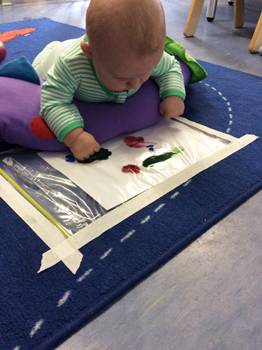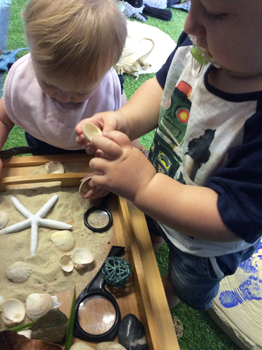Curriculum
Our 0-3 years (Nido environment)
Our aim is to promote a love for learning by accommodating individual learning styles, needs, capabilities, and freedom of movement.
Social and effective development is a fundamental focus in this age group.

The following are some of the opportunities we offer:
- We offer a range of language activities to develop and expand the children vocabulary through a vast array of experiences with music, stories and sounds.
- We offer social experiences to allow the children the opportunity to be independent and work within groups alongside others, share emotions and being able to recognize and express feelings.
- We offer sensory activities that prepare their minds for intelligent observation where the children explore concepts of dimension, colour, and shape and encourage comparison, observation and problem solving.
- Also, practical Life activities that support the children in developing skills to successfully deal with day to day experiences. These activities allow the children to engage in meaningful tasks such as caring for animals, food preparation, cleaning, using kitchen utensils, and builds skills that will allow children to contribute to the society in an independent and responsible manner.
- Cognitive experiences allow the children to expand their concentration, develop memory and recall while sorting, matching and manipulating objects.
- Motor accomplishments develop gross and fine motor skills as well as increasing body awareness and control to increase the children confidence and concentration.
Our 3-6 Room (Casa Environment)
In the 3-6 years (Casa) environment, the children learn by doing a hands-on approach. The concrete material tasks set out within the environment, allowing the children to explore the world through their senses, through touch and motion, and by observing and engaging with others, (Scaffolding one another’s learning).

One main feature of Montessori education is its hands-on approach to learning. The children work with specially designed materials, manipulating and investigating until they master the lesson inside. We believe “EDUCATION: is a natural process carried out by the human individual and is acquired not by listening to words, but by experiences in the environment”. Educators role are to guide the children through the curriculum as children are ready for each new challenge, introducing lessons and then letting children practice what they have learned. (Learning at their own pace and capabilities) As children grow, the classroom materials grow with them in the sense that older children use the materials to explore curriculum in new and deeper ways.
The 3-6 year old goes through an intense period of change, including the transition to cooperative play and more complex social interactions, a language enhancement leading to skills in writing and reading, the emergence of number sense and the foundations of math, and great changes in physical development.
As Montessori educators we respond to these changes in social and emotional, cognitive, and physical development with appropriate lessons to support each child’s growth and emerging capabilities.
We are continuously striving towards “Early Childhood education is the key to the betterment of society”. These experiences are sorted into six developmental areas that extend on social, language, practical, sensorial and then provides cultural and mathematical experiences.
Language development and materials are where the children are exposed to abundance of language experiences through the materials, stories, discussions and cultural materials.
Practical life skills is one of the most important areas for this group, it provides a link between home and school environment.
There are four areas of practical life skills:
- Care of self, such as zipping, washing and drying hands, brushing teeth, blowing nose, use of toilet, these skills will help the children gain independence.
- Care for the environment, such as caring for their veggie garden, cleaning the chicken’s coupe, wiping their tables, sweeping the floors which teach the children develop their fine and gross motor skills and sense of achievement, responsibility and self esteem.
- Social relations by encouraging the children to use their grace and courtesy, serving themselves, helping others, using the magic words please and thank you, it teaches the children to learn dignity, respect for others.
- Movement and practical life skills help the children practice and refine both fine and gross motor skills ready for the more academic skills such as reading and writing.
Children like to copy what adults do, so the prepared environment facilitates real materials, easy to reach and use.
Sensorial Materials are designed to enable children to categorise what the children already know and experienced through life.
Cultural experiences provide the children with an understanding of biology, geography, art, history and botany. The children make interesting discoveries about the world they live in.
Mathematical activities introduce the children to concept of time, distance, dimension, currency and quantity. As children work within these opportunities they gain a strong recognition of numbers and their corresponding quantity and gain a solid foundation of mathematical operations such as addition, subtraction, multiplication and division.

